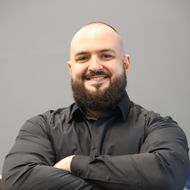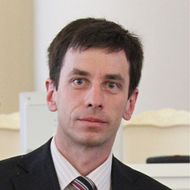'If You've Completed a Hard Route, It Doesn't Mean You Should Give Up Your Training'
On February 8, HSE University-St Petersburg celebrates the Day of Russian Science. We congratulate all researchers and wish them continued openness to new discoveries. To mark the occasion, we talked to scientists about the sources of their inspiration, moments of anxiety, and having fun.

Aleksei Shpilman, Academic Supervisor of the Master's in Machine Learning and Data Analysis

Some years ago, my colleagues and I conducted research in the vein of Tony Stark. We wanted to understand what various AI systems capable of managing society might look like. We took a great interest in the possibility of an 'AI government' coming into existence at some point.
To make our first steps in this direction, we used the Neural MMO environment—it is almost like The Hunger Games, but in an AI world. There are eight clans of neural agents which obtain food and water in a rather simple environment and fight for resources. We appointed a government agent which can punish them for wrongdoings, but the government agent defined by itself which actions were 'wrong' based on the general goal.
That was the moment when we started thinking about a general goal which could define the common good. Firstly, we thought that the best one would be the average life expectancy. Aiming to increase it to the maximum for the whole population, the government agent decided that the best option was to destroy seven out of the eight clans. But the last one would live happily ever after!
This story proves only one point: we should be careful with integral metrics. But we have managed to develop a good research direction on how to explain the term 'justice' to AI with mathematical methods—in order to make it understand this concept in a less bloodthirsty way.
Adrian Selin, Dean of the School of Arts and Humanities

In Smolensk, in 2013, there was a funny case during an excursion organised by the local scientists for an international conference. They showed us the place where a royal army camped out—in 1633, Władysław IV, King of Poland and Grand Duke of Lithuania, stayed there.
The colleagues from Smolensk, trying to please the Polish scientists participating in the conference, said: 'After that, Smolensk remained a part of Poland'. The Polish colleagues were puzzled: 'What do you mean?' The Smolensk citizens repeated: 'Well, Smolensk was a part of Poland...' 'Not really,' said the Polish colleagues, 'Not Poland'. 'Why?' 'Not Poland, but the Grand Duchy of Lithuania'. The Smolensk citizens summed up: 'But it is the same thing...'
Galina Shirokova, Professor at the School of Economics and Management

The most exciting moment for me is the start of a new project or article. Every time new ideas form in my head, I experience an incredible upsurge and joy—it is like a miracle. It might be similar to the creative acts of a poet or artist. As soon as an idea appears, I have to discuss it with colleagues and potential co-authors immediately; that is why I usually call or text them right away to discuss it from different angles. Of course, then there is a long road to implementing the project, which may take years (and sometimes the result differs from what was designed at the beginning).
There are plenty of other amazing moments in a scientific career—the successful presentation of a PhD student, the publication of an article in a top foreign journal, speaking at a leading international conference, receiving rewards and prizes for scientific achievements... All these things are wonderful and bring both excitement and joy. But only at the moment when an idea appears do you feel like a true creator of something new and anticipate a very interesting scientific journey.
Mikhail Glazov, Professor of the Joint Department with the Ioffe Institute

It is easy for me to tell a couple of stories from the life of a scientist, but it is hard for me to choose the best one. But I know one which can inspire anyone. It involves American physicists, the Swedish king and the Nobel Prize—it's hard to argue against such a winning combination.
So, in 1956, three American physicists—John Bardeen, William Shockley and Walter Brattain—received the Nobel Prize for inventing the transistor. Usually, prize winners, their colleagues, and their close relatives are all invited to the award ceremony in Stockholm.
Bardeen had three children, but he came to the ceremony with only one of them. The Swedish king Gustaf rebuked him for it, to which the scientist answered jokingly that next time, he would bring all his children to the ceremony for sure.
However, Bardeen managed to keep his promise to the Swedish king. In 1972, he was honoured with another Nobel Prize in Physics—this time, together with Leon Cooper and John Robert Schrieffer for developing the theory of superconductivity.
Two facts in this story inspire me the most. First of all, there is no room for complacency. It is the same with downhill skiing—if you've completed a hard route, it doesn't mean you should give up your training. Perhaps there is a more interesting route somewhere else. Second of all, I am inspired by John Bardeen's broad outlook: his first invention, the transistor, was in an applied field, while the theory of superconductivity was in a fundamental one. Looking up to him, you should not be afraid to change your research field. It is the only way to find something new.
Yury Kabanov, Academic Supervisor of the Bachelor's in Political Science and World Politics

The most exciting moment for me is waiting for journals to decide if they are going to accept my article or not. It might take several months or even a year before you get your first reviews. Then you have to make amendments and wait again—this time for the editors' decision. The more prestigious the journal, the longer you will have to wait and worry about the result.
Recently, one of my articles was published in a journal which I really worked hard to get into. The whole process took more than ten months, excluding the time it took to write the article (which was almost as long). Everything went well in the end, and all the spent energy and nerves were worth it. But, unfortunately, sometimes this kind of anticipation is nerve racking.

